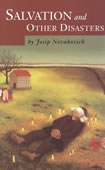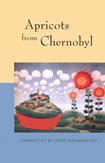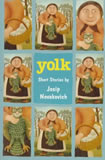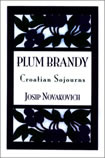|
||||||||
|
|
||||||||||
|
|
Snow Powder
|
||||||||||
 * * |
Mirko rushed home, skipping steps through flurries, a richer man than before, with more world around him, and a better and greater world it was, just as an orange is bigger unpeeled than peeled. It was as though the world, a peeled orange that had dried and grown bitter, had got back its skin and freshness, a chance to be juicy again. He savored the crunching sound, and tried to make a melody out of it, by crunching the snow slowly and quickly, gently and roughly. He picked a little snow from an evergreen branch, and ate it. He buried his face in it. Snow, heavenly snow.
That evening his father, Zvonko, arrived from Germany. Business at home had been so bad that nobody wanted mechanical watches and everybody got cheap quartz ones from China at street markets, and so he went to Germany once a month for a week, to sell old watches and clocks at antique fairs.
It took me ages to get here, Father said. So many roads are blocked, Serbs had taken so much land, that I felt like a fly entering a bottle through a rotten cork. But you all have been fine?
Thank God, said his wife Neda. People here get along pretty well. We aren't like those madmen in Eastern Bosnia; we don't care who's who.
You think?
Zvonko gave Mirko's brother Boro various coins--several 10 Franc pieces, with yellow brassy circles and nickel insides, from a fair in Strasbourg; a five German-mark coin; five Swiss frank coin with a thick cross on a shield, Italian liras . . . Now Boro piled them up into little towers and asked how much each was worth in dinars.
You can't do that in dinars, Mirko said. The dinar is worthless. Do it in German marks.
Good advice, said Zvonko. A German mark is worth 3 francs and one thousand liras.
Are Italians the poorest if their money is worth so little? asked Boro.
No, they just like a lot of zeros. In Italy everybody is a millionaire.
 * * |
After supper, the father and his sons went outdoors, and built a snowman. Zvonko used two old irreparable watches as the snowman's eyes.
The following morning, Mirko was awakened by his father's kiss over his ear. That kiss triggered his inner tuning fork. The lights were on. Mirko jumped out of bed to see whether the snow was still there.
Don't worry, the snowman is going nowhere, Zvonko said.
The previous year, Mirko had cried when his snowman melted, and he still kept the shrunken snowman the size of an Egyptian mummified kitten in a ziplock bag in the freezer. Death of his snowman had grieved him for days. The fact that snow everywhere had melted was bad enough, but that his friend, whose soul was made out of snow, would also melt and vanish, and had, hurt him. But this time, Mirko was not getting attached to the new snowman, even if his watch-eyes had stalled the time perhaps from before Mirko's birth, perhaps from before the real global warming effect, when winters were continuous howling snowstorms, and the world a pattern of shifting snowdrifts. Oh, how lucky my great-grandparents must have been, he thought, but then remembered that they had been slaughtered by Serbs in the Second Balkan War, in the winter.
Have you done your homework? his father asked.
We had none.
How nice!
Is it all right if I go to school on my skis?
But, do you have a place to hide them?
I'll bring them into the classroom and keep them behind the stove.
Mirko put his ski shoes on and clipped them onto the skis, and with the schoolbag at his back, he started toward the school, but as he rounded the first corner out of Father's sight, he went on, up the hill, through the park, over the trails where he had played Robin Hood during the summer. He found it awkward and painful to go up the hill waddling like a duck, so he took off the skis and carried them, but they separated from one another and dangled and resumed their old fencing match. To handle them better, he got rid of his school bag, which he hid in a bush. He climbed high into the hill, reaching the dazzling line of daytime, a storm of light of the rising sun, capping the dark blue below, and he slid down back into the slumbering morning on his skis. He kept his balance, and rode in terror, delicious terror, that he would fall, shatter his bones, fly . . . and he did fly over uneven spots. The cold moist air and granulated snow smarted his face and chilled his ears. To stop, he deliberately fell into a snowdrift, and he climbed the hill again. This time he would go to the top, into the mountain, and he'd ski down for more than a kilometer. He panted as he went up, and ate snow because he was thirsty.
Stoj! a voice shouted. Halt!
Mirko looked around but saw nothing.
He rubbed his eyes, and when he opened them again, he faced several men in camouflage, which visually merged with the sickly evergreens behind them, with patterns of green and brown, as though the men too had been eaten by acid rain, or as though the acid-bitten trees had begun to move and chatter and threaten behaving like mirage soldiers.
What are you doing up here? a soldier said. You got me so startled I almost shot you!
Really? Mirko said. Why would you do that?
Nice skis, where did you get those?
From Germany. My Dad works there.
For those Nazis? Let's make a deal, I'll give you my gun, and you give me your skis and boots, how is that?
No way, said Mirko.
What do you mean, No way? I can take your skis if I like. You are our prisoner, a POW, don't you know that?
Prisoner? That's exciting, Mirko said.
We'll make sure it's exciting.
I don't mind that if you let me ski.
But if we let you, you'll ski all the way down to the village, and you'll tell everybody we are here.
No, I won't.
All right, we'll let you go if you come back with a flask of plum brandy.
What if I don't come back?
Let me show you something. The soldier led Mirko to a cannon on wheels and slid a missile-like bomb into the pipe. See, it even has a telescope so strong that you can see the rings of Saturn at night if you like. You want to take a look? Show me your house in the valley. When you look at it, it'll feel like you are right there.
That one, with the green roof, Mirko said.
All right, we'll have to adjust the scope angle. There. So now when you go back down there, if you tell anybody we are up here, we can blow you up, is that clear?
You tricked me.
You are a good boy, I have one at home just like you. Nothing will happen to you, just remember to bring the brandy.
Mirko took a magnificent glide down the mountain, splashing snow left and right; the snow clouds that burst up from under him filled with sunlight, refracting fleeting rainbow fragments.
The following day, it rained, so it was not a good day to ski, but looking up the mountain, Mirko imagined that it snowed up there. Yes, for every 100 meters, you lose one degree Celsius. You gain snow. He wanted to go up the mountain, but not today. He longed to see Bojana, to smell her cheeks. As he walked, he looked over the minaret and a church dome into the mountain, and for the first time ever, he felt guilty that he was going to school. That was truly irresponsible of him; what if the soldiers up there got angry that they had run out of brandy and bombed the town? They could kill his parents, his brother; their bomb could strike any moment in the streets, and tear him to pieces. For a moment, he hesitated; of course, he should rush home, and save the town. It would be terrible if they all died simply because he wanted to look at Bojana's face. But it would be almost as terrible not to see her face.
At the beginning of the math class, he was tempted to tell everybody that they were encircled by a Serb army, that any moment the bombing could start, that they were all in mortal danger, and that the only way out of it was to collect plum brandy and haul it up into the mountain. He enjoyed the power of his knowledge. He would not tell them, just not yet.
He gazed blissfully out the window. Having missed a day, he also missed homework. The math teacher checked homework, and Mirko tried the old maneuver--he'd forgotten the notebook at home.
Awfully
forgetful at your age, that's no good, said the teacher. Now, at my age it would
make sense. All right, prove at the blackboard you did your homework.
He gave
Mirko the assignment, to divide 44.29 into 682.91.
Mirko was hesitant. He'd never done a division like that, and didn't know what to do with the decimal points. He remembered the buzz in his ears, but there was none. His knees shook, and to steady them, he tightened his legs and stood up straight and stiffened. The class laughed. They all seemed to relish the fact that he couldn't do the math. He looked for sympathy in Bojana, but she'd joined in the mob lynching by laughter.
All right, do it without the decimal points, the teacher said. You get those out, and the proportion stays the same. Do it now.
Through tears, Mirko couldn't see very well. The class still jeered. He got so flustered that he forgot which way to go, from left to right or right to left.
Get lost, said the teacher. Before you fight with boys, just get lost. Go home and do your homework. No wonder we have wars here, when you all grow up like thugs. Why can't you boys get together to do math? Or play chess? Just ten years ago, kids played chess everywhere, and now, I never see a kid with a chessboard.
Till the end of the class, Mirko stared at the low drifting clouds, his face still brimming and hot. He imagined washing his face in the snow, cooling his cheeks off.
He was sitting close to the tile furnace, in which coal burned; there was a large weaved basket full of coal in front of it. The side of his face closer to the stove was hot, and the slight smoke stung his eyes. The tiles crackled, and he wondered whether the heat did it; he knew that it made some things expand, and others shrink. He wondered what the heat did to the rocks, and how global warming would affect the mountains. Would they all grow? Wasn't it true that the tallest mountains were close to the equator? Or was that because of the rotation of the globe? Or both? And why was it that Mars, which was a little smaller and rotated faster than earth, had a mountain twice as high as Mt. Everest? Was that mountain close to the equator of Mars? He got so absorbed in his thoughts that he did not notice when the class was over.
Look at our genius, said one of the boys. What do you think goes on in his head now?
He's probably figuring out what two times two equals.
Mirko heard that but did not bother to answer the provocations.
During the break, he walked by himself. He looked around for Bojana, but he couldn't see her in the crowds of kids.
What are you looking for, my friend? Toni, the best soccer player in the class, asked. Your little girlfriend? Come, I'll show where she is.
He
looked where Toni was pointing, to the old chestnut tree. Bojana was leaning against
the tree with her back, and Stevo, the class goalie, was kissing her.
Toni
jeered. So, what is two plus one?
Bojana saw him over Stevo's shoulder, and then closed her eyes and kissed more strongly than before.
Mirko did not know how to respond. Should he go and fight Stevo, defend his honor and love, defend her? But she clearly was not reluctant; she put her arms behind Stevo's neck and pulled him to her. When the bell rang, Stevo walked ahead of her, not looking at Mirko, clearly not wishing any fight. She walked behind him, smiling, her lips scarlet, her cheeks and eyes full of light, viciously beautiful so that even at that moment Mirko marveled at her and loved her.
You know what? she said. We didn't do it right. We just lip-kissed, which doesn't count. You got to tongue kiss, deep-French kiss, that counts. You just saw my first real kiss! It's wonderful, so much better than lip-kissing, you got to try it one day when you grow up.
Mirko did not respond. He did not walk on, but continued standing and staring at the tree as though he could still see what he should have been doing. He did not go back to the classroom. He left his books there. On the way home, he was out of breath although he walked slowly.
In the streets, soldiers drove in regular cars, mostly VWs. That was something new-by the flags some displayed on their uniforms, it was clear this was the new Bosnian army. Did they know about his friends in the hills? Would there be fighting? He hoped there would be.
 * * |
At home, he stole a bottle of plum brandy from the pantry, from among the jars of plum jam and pickled peppers. The bottle clanked against the jars but nothing broke.
His father caught him outside.
You are too little to be interested in brandy. What do you think you are doing?
I need it. If I hurt myself skiing, I can clean my wound with this.
Don't lie, you little thief. I'll teach you to steal!
And his father, who had not spanked him in years, twisted his arms, nearly breaking them, and then beat him with his thick western belt, which he had pulled out of his blue jeans. His blue-jeans fell back to his knees, and he stood in his white underwear, belting his son's back, sprawled over unsplit firewood beech logs which smelled of oyster mushrooms and soil, the smells being enhanced in the snow through Mirko's gasps and steamy breath.
Cry, you little bastard.
But Mirko would not cry. He ground his teeth; he'd rather die than surrender. It struck him as immensely unjust that he was being punished by the man he was about to save. His father could not know that his son was saving him, but now Mirko would not tell him, out of spite. If Father could not suspect good intentions, if he needed to talk and accuse, the hell with him. Mirko did not cry, but tears blurred his vision, and the silvery logs and the snowman with watchful eyes and the whole sun-struck yard broke apart in shafts of light in the diamond splendor of his pain. The beauty of it all surprised him, and so he even welcomed the scorching licks of ox leather on his skin.
His Mother shouted from the house door. Stop it, you old beast! Stop it! She came down the cement stairs in her wooden shoes and pushed her husband away. She carried Mirko to his bed, and used the plum brandy to wash the stripes on his back.
No, don't do that, Mirko said. I am not bleeding.
Yes, but you are all striped, like a little tiger.
For a day, he stayed in bed, on his belly because of his sore back. He imagined his classmates going to school, playing and laughing. The soldiers probably still walked in the street. Would the artillery men wait for one more day? He expected a grenade to strike any moment, but he was not afraid.
In the morning, before dawn, he was surprised that no bombing had taken place. But if he undertook nothing, the house would be wiped out. He took the nearly full bottle of plum brandy and his skis, and walked out onto the mountain, which in the pre-dawn light looked all blue. Halfway up the mountain, he stuck his skis into a snow covered bush, leaving only the curved tips out. Maybe he'd pick them up on the way back if he ever came back.
By the time he reached the Serb bunkers, sun had cast an orange hue layering it over the blue of the slopes, while the valley still lounged in the hazy indigo. The soldiers were happy to see him with the bottle, which they passed around, emptying the contents within a minute. Good timing, boy, said one of the soldiers. We plan to start blasting your town and we worried about you. It's so great to see you! said another soldier, and he slapped Mirko on the shoulder. Mirko winced and groaned.
What's the matter? You can't take a little bit of patting?
I am sore, I fell while skiing last time and scraped myself.
Let's see your back.
Mirko struggled not to take his shirt off, but then thought better of it; let them see, let them understand that living at home was hell. He took off the flannel shirt and the sleeveless undershirt, and shivered.
My God, said one of them, that's no skiing injury, that's a regular old-fashioned belting. That's how my father used to beat me, and see what good effect that had on me. Poor thing.
The soldiers gathered and examined the swollen welts.
What did he beat you for?
Plum brandy. He thought I was drinking it myself.
When you go down there again, just buy brandy in a store, all right? You don't need to irritate your Dad. Here, I'll give you 30 marks, and you buy me coffee and plum brandy.
I am not going back there any more. I am joining you.
You want to fight against your town?
Yes, I have declared war on them already. They don't know it yet, but they will.
Well, run away from home for two-three days, just to make them nervous so they'd love you again, but don't overdo it.
The artillery man, who was chewing a strip of bacon, sat him down on his knee and showed him his town through the scope.
At the sight of the school, Mirko gasped. Let's shoot, he said.
What if there are children there, you'd like to kill them?
I'd like to destroy the building. It's Saturday, nobody is there now.
How do you know? Maybe the cleaning women are washing the stairway or something. . .
I doubt it. The stairway hasn't been cleaned in ages; they just don't do that.
Do you want to wait for Monday? That could work better-you could get them all!
No. Let's just smash that ugly school right away.
Maybe you'll have your way. The captain has selected a few targets, the metal factory, the railway station, and yes, the school. The school, he thinks, could already be full of soldiers because of the thick walls. We can aim for the windows, blast inside.
The artillery man called his assistant over, to adjust the projectiles. The captain came by, and nodded. Yes, that's a good idea. We've waited long enough. Go ahead!
Now, my boy, the artillery man said, I've already taught you how to aim the scope-so do it.
Mirko adjusted the scope to the black tall window in the middle of the yellow building, on the second floor. As soon as he saw the window, he recalled all the humiliation he'd endured: the math teacher, the boys who attacked him, the girl who played love games, which were actually, he was sure, hate games. Now he would show her, him, them. They would never gather in that room again, he'd make sure of that. The stove, the blackboard, everything must go. The creeps can gather for school in the basements, below taverns, and enjoy the restroom smells.
The artillery man right next to him breathed heavily, and coughed; his breath smelled of garlic, so Mirko breathed shallow, at least tried to, but couldn't because his heart pounded and he panted from the excitement, desire and trepidation. He trembled, and did not know whether from fear or the cold. His teeth chattered, the ear buzzed, the tuning fork resurrected itself in his ear and chimed a high C, which darkened the yellow valley.
Here, have the earphones, said the man to Mirko.
No, I'd like to enjoy the full blast.
Your eardrums would rupture. Put it on, be a good boy. Do you want music piped in? You could watch your school blow up with your favorite piece of music in the background. What's your favorite music? Maybe we got it? We got Jimi Hendrix, "Machine Gun." I loved that stuff when I was your age.
Explosions, that's my favorite music.
OK, you got it. You know, we've all been waiting for this moment, and it's just a lucky synchronicity.
What's synchronicity?
You'll find out in due time.
A few seconds later, a powerful blast shook Mirko. The cannon recoiled, emitted fire and smoke, and ten seconds later, there was another blast, a smaller one, at the school. The sound from there came shortly afterward, as a small echo.
Again! he shouted. And that was the loveliest morning he had ever spent. His bones had been shaken, even his teeth, in such a way that his bones felt happy, hale, for a moment at least, until a dread descended onto him. He tasted the dread as smoke and diesel in the back of his nose, thickly descending into his throat and stinging. He looked down into the valley, into the smoke, which grew higher and wider. What if a class had gathered for an extracurricular activity, such as acting or dancing or singing? Did Bojana go to those clubs? What if he had just turned her beautiful red lips into blood? He no longer hated her, no longer wanted revenge. What if he'd just become a mass murderer? Could he go back and live in the town again? Could he walk in the town as though nothing had happened, and worry about decimal point divisions, the quality of snow, and the shine on his skis? Would he walk around wrapped up in a cloud of gun smoke which would never leave him?
No, he would not go back to study at school torture chambers to become a scientist or an engineer in many years. He could become a soldier right away, going from mountain top to mountain top, blasting away. He had found the best job in the world for a boy.
© Josip Novakovich








